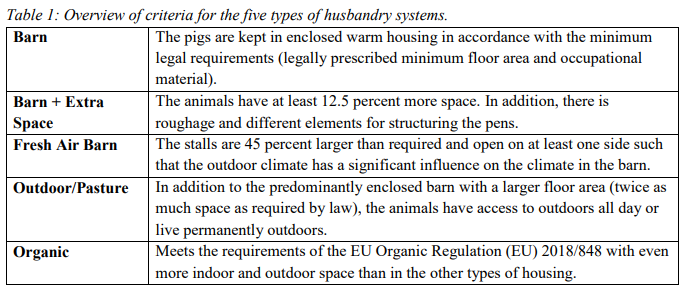[ad_1]
After more than a decade of political discussions on the restructuring of livestock farming, a new German law on mandatory animal husbandry labeling went into effect on Aug. 24. It requires hog farmers to report their husbandry practices and food businesses to label goods accordingly. The label is part of the overall aim of the German Federal Ministry of Food and Agriculture (BMEL) to transform the livestock sector, USDA Foreign Agricultural Service (FAS) shared in a recent Global Agricultural Information Network (GAIN) report.
“Germany has seen an immense decrease in hog stocks in recent years. Never since German unification in 1990 have fewer pigs been kept in Germany. This has been the consequence of multiple crises at different levels. In general, the economic situation of hog farmers has been difficult for years, mainly due to decreased demand and closed export markets because of outbreaks of African swine fever in Germany. But even though profitability has now been restored (after more than two years), many hog
farmers are quitting the business because of the political and financial uncertainty they are facing,” the report says.
The BMEL believes the introduction of the new mandatory label is a first step in transforming the livestock sector, the report says. However, the recently made public federal budget plans for 2024 do not include financial resources for the support of farmers willing to convert their barns. This indicates that the difficult economic situation for hog farmers is likely to remain the same.
The mandatory animal husbandry labeling law was approved by the German Federal Parliament on June 16. Germany is taking the lead with this law in the European Union (EU), the report notes.
“Initially, the German government aimed for domestic mandatory labeling standards for imported products, but the EU and World Trade Organization trade
laws prevented it. The European Commission notified the bill ahead of its adoption and the final law does not apply to products from other EU countries or countries outside the bloc. Labeling corresponding to imported goods for the German market can be done voluntarily but will not become mandatory,” the report says.
A Look at the Label
The label differentiates between five types of housing: (1) Barn, (2) Barn + Extra Space, (3) Fresh Air Barn, (4) Outdoor/Pasture and (5) Organic. The labeling requirement initially only applies to fresh pork (chilled or frozen, packed or unpacked) from animals raised, slaughtered and processed in Germany, USDA explains. The determining factor for labeling is how the animals are kept during finishing. Distribution channels affected are retail, e-commerce, as well as farmers markets. An extension of mandatory labeling for out-of-home catering and gastronomy is planned for 2024. The label is supposed to be extended to other animal species and products (e.g., processed products), too.

Source: USDA FAS
“Technically, no new animal husbandry requirements are associated with the labeling. However, there is immense social pressure on livestock farmers with the demand for more animal welfare,” the report’s authors write. “The new mandatory label aims to highlight the accomplishments of farmers and gives consumers a chance to make an informed purchasing decision. Politically, the conversion to more ambitious animal husbandry systems is supported by legal privileges in construction law for farmers who want to convert their livestock facilities to the “fresh air barn,” “outdoor/ pasture,” or “organic” systems.”
[ad_2]
Source link
